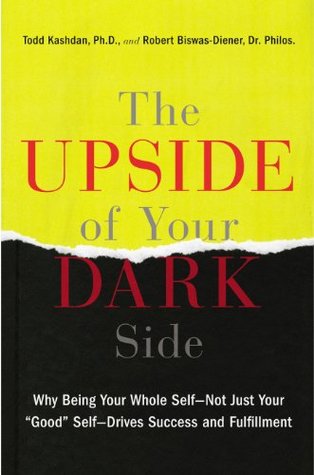More on this book
Community
Kindle Notes & Highlights
by
Todd Kashdan
Read between
May 15 - May 15, 2022
Here we present a body of research that suggests strategic use of the dark side of your personality, including helpful behaviors that happen to be rule bending, dominant, cold, fearless, grandiose, manipulative, flamboyant, and self-absorbed. A minority might dislike you but nobody ever achieved great success or pushed the boundaries toward innovative change with a 100 percent approval rating.
To motivate, improve performance, and survive you have to give yourself permission to engage in acts of dominance, aggression, strategic manipulation, and selfishness (putting yourself, family, and innermost circle first).
The three elements of Machiavellianism, narcissism, and psychopathy (we call them the Dark Triad) each represent a tightrope. Lean too far one way and you hurt other people; lean too far to the other side and you become incapable of taking risks, or being truly effective. The Dark Triad lies at the core of every fictional antihero. In each case, they have flaws but also provide us a fantasy of a more successful self. Think
Defensive pessimists, according to Dr. Julie Norem at Wellesley College, “hope for the best but expect the worst.” It might sound as if these characters need to be fixed or improved or optimized, but hold that thought. Defensive pessimists do not necessarily wear dark glasses all the time or expect to fail in every life situation. But even if they were successful in the past, they know this time could be different. So when Mom has an upcoming plane trip with three small hyperactive children, she might burst out a defensive pessimism strategy that could include lower expectations for how things
...more
When they’re in a good mood, they become complacent; they no longer have the anxiety that typically mobilizes their effort. If you want to sabotage defensive pessimists, just make them happy. What’s more, initial research evidence indicates that these types of people don’t experience negative moods as intensely as people who are more routinely upbeat. That is, their lowest lows aren’t so bad. In fact, research shows that defensive pessimists perform better than optimists in stressful, challenging situations. In Singapore, when the government warned the public about an outbreak of severe acute
...more
What about the value of positivity when it comes to big societal issues, like the well-known gender gap in many science, technology, engineering, and math disciplines, in which men outperform women? About 60 percent of this gap can be attributed to prior background and preparation, but that leaves 40 percent, much of which is due to the psychological hazards of feeling inferior, devalued, and even hardwired to fail. Being reminded that you are a woman before taking a test activates this negative feeling, leading women in this situation to perform even worse. But here’s an amazing finding. For
...more
Research on the benefits of pessimism, as well as studies on positivity bias, offer an important lesson: it is high time that we reevaluated long-held beliefs about what is negative and what is positive, psychologically speaking. It is time for a new way of understanding what it means to be mentally healthy and successful, to see both positive and negative as part of the larger, and more viable, whole.
Modern psychological scholars are not naïve about neurosis, hardship, and the darker half of human nature. The real travesty comes in dismissing these as ills needing to be cured in the same way that cancer needs to be treated.
For people who are able, even artificially, to reframe anxiety as excitement, there is a subtle but powerful shift away from the internal state and toward the situation. Brooks calls this an opportunity mindset.
By not only accepting but also actually embracing the less comfortable aspects of your being, if only for brief periods, you maximize your chances for true success and becoming whole. This, and not some feeble-minded happiness, is the true Elysium.
People were attracted to the notion of short-term pleasure and long-term meaning (see the figure below). It’s as if people are saying, “I care about meaning, I just don’t care about it right now!” We are, it turns out, short-term hedonists and long-term saints.
Edward O. Wilson describes the value of boredom in his autobiography, Naturalist: Adults forget the depths of languor into which the adolescent mind descends with ease. They are prone to devalue the mental growth that occurs during daydreaming and aimless wandering . . . often I just sat for long periods scanning the pond edges and vegetation for the hint of a scaly coil, a telltale ripple on the water’s surface, the sound of an out-of-sight splash. How we react to this internal state determines whether boredom becomes a healthy or unhealthy influence. For instance, you can try to eliminate
...more
As with other states of mindlessness, something special can happen during periods of boredom. When the brain is left to wander, at best it’s a springboard to creativity and growth, and at worst it encounters a brief period of discomfort. Boredom can also be a state of low energy, signaling that work is complete and acceptable. That is, nothing is left to do so a person feels aimless, but this lack of direction is association with the satisfactory completion of tasks. Last, boredom can have motivational impact, pushing a person toward novelty, providing the mental gun to the head that helps
...more
Well, we’re here to tell you that we adults need to improve our emotional literacy as well, especially if we want an additional edge when it comes to improving our success and well-being. Yes, it’s useful to distinguish between positive and negative emotions and aim for a higher frequency of positive emotions in everyday life.
What we have discovered is that by understanding and distinguishing negative emotions, we transform them and detoxify our mind and body.


